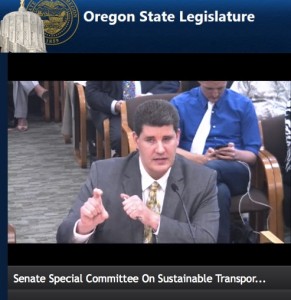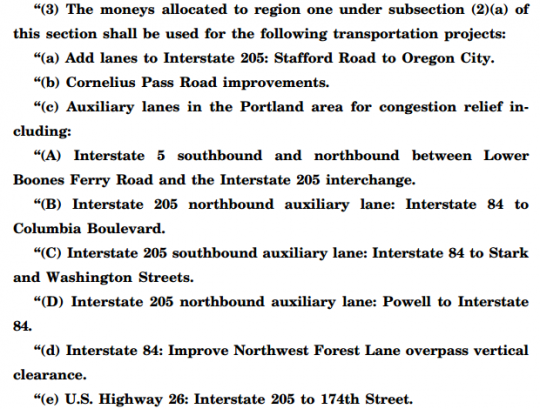Despite growing consensus that the main effect of widening roads is not to reduce travel times but rather to lengthen car trips, Oregon’s overwhelmingly Democratic state legislature seems to be preparing to approve a bill that would spend around $78 million to add lanes and widen several freeways in the Portland metro area.
More widening projects are also planned around the state.
HB 2281, the 73-page bill being debated in Salem today, would raise $370 million through a mix of new vehicle registration fees and a two-cent gas tax increase. About $125 million of that would go to the Portland metro region (ODOT Region 1). The bill also includes 25 earmarked projects — most of which would widen freeways to “improve safety and provide congestion relief” and allow for “freight mobility improvements.”
There’s nothing in the new bill set aside specifically for bicycling or walking, though the multimodal Connect Oregon program would continue, presumably still funded by the state lottery.
You can read a useful summary of the bill here, but here’s the operative text from the bill itself:
As you can read above, state funds for the Portland area would be spent either on wider freeways ($75 million) or on on one of four other projects:
- $3 million to add standard travel lanes to Interstate 205 west of Oregon City
- $20 million in unspecified “improvements” to Cornelius Pass Road, a mostly rural route in Washington County that has sometimes been discussed as a possible route for a future freeway bypass
- $2 million to increase the vertical clearance on a freeway overpass
- $25 million to improve Powell Boulevard through East Portland enough for a jurisdictional transfer to the City of Portland
This list refers only to state projects funded by the new revenue. Half of the revenue from the hikes would be passed from the state to its cities and counties, who could then spend their share of the money on whatever roadway projects they saw fit.
Advertisement
Because of a series of ballot issues in the 1980s, Oregon’s constitution prohibits spending auto-related fees and taxes on off-road bikeways or mass transit. However, advocates had hoped that Oregon’s most Democratic state legislature in a generation would create a permanent fund for making multimodal urban roadways like Powell Boulevard, Barbur Boulevard and 82nd Avenue safer to walk, bike and drive on.
For advocates of a shift to more biking and walking, the one bright spot in the plan so far might be the allocation for outer Powell. East Portlanders have pushed hard for walking and biking improvements there.
Another notable piece of the bill would allow transit districts to levy an employee payroll tax (0.185 percent of wages earned) that must be spent on improving bus operations and service. TriMet already collects employer payroll taxes, but this would be slightly different because it’d presumably show up on employee paychecks rather than being hidden on the employer’s side of the ledger. In the TriMet district, this would generate an estimated $71 million annually — enough to increase TriMet’s bus operations budget more than 40 percent.
This bill is a far cry from the agreement before this year’s legislative session in which automotive interest groups teamed with other transportation groups to endorse a larger inflation-indexed gas tax hike.
So far, the representatives of oil and gas businesses seem supportive of the bill. This is likely because it was created as an alternative to a “clean fuels” bill that had already passed the legislature but is now on the brink of repeal as Democrats try to cut a deal with Republicans on the broader package. The new bill calls for fuel blending, something oil and gas lobbyists prefer to a mandate on a new type of fuel.
Stay tuned as we try to keep up this fast-moving bill. For more on today’s hearing, follow the Oregon Environmental Council on Twitter. We’re also indebted to Gerik Kransky, advocacy director for the Bicycle Transportation Alliance, for helping us follow some of the details.
Download a PDF of the current version of this bill here.
Jonathan Maus contributed reporting to this story.
Correction 12:01 am: An earlier post used a different estimated value in the headline for the planned Portland-area freeway widenings. The corrected headline reflects the $20 million cost of “improving” Cornelius Pass Road, which is not a freeway.
UPDATE, 6/15 at 11:12 am: This package is dead. Governor Kate Brown says there’s “no path forward” this session. Full story at The Oregonian.




